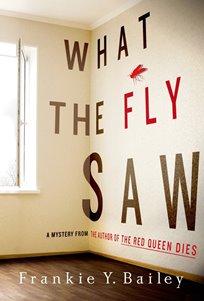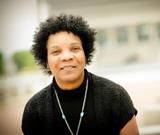 DATE: February 19, 2020
DATE: February 19, 2020
Subject: Detective Hannah McCabe, Albany PD
Interviewer: Maggie Gale, UAlbany senior
Gale: This café is a great place to meet. Your friends Chelsea and Stan seem really nice.
McCabe: And they’ve even persuaded a non-vegetarian like me to try stuff made of bean sprouts and tofu. Of course, this is my day off and I’m opting for real silverware. My partner and I eat a lot of take-out at our desks when we’re working a case.
Gale: Your last big case was that funeral director who —
McCabe: Yes, but I understand from Professor Charles that what you want to talk about is a typical day in my life.
Gale: When she mentioned that you’d been in several of her psychology classes, I was so excited. What I want to do is capture a day in the life of female professionals in different fields. So far, I’ve interviewed a pediatrician and an accountant. But neither of them carries a gun or gets shot at.
McCabe: I don’t usually have bullets flying over my head, either. As a detective, much of what I do involves trying to fit the pieces together. If I’m working a homicide, there’s a dead body and I need to figure out how it got that way. That involves talking to people who are often frightened or in shock. One of the most difficult parts of my job is breaking the news to family members.
Gale: So you’re saying what you do as a detective involves dealing with people. It isn’t all high-tech forensics.
McCabe: That’s exactly what I’m saying. Not that we don’t rely on our surveillance system and the evidence collected by the forensic techs at the crime scene. And, of course, the medical examiner’s autopsy is crucial in helping up to reconstruct the crime. But an investigation involves getting people to talk to you.
Gale: So the psychology courses you took when you were at UAlbany have come in handy.
McCabe: Absolutely. But I was a double major in Psychology and Criminal Justice. I wanted to understand the criminal justice system and, even more important, have a chance to study the theories about why people commit crimes. I wanted to understand what role social factors play in criminality and what it’s like to be a victim of crime.
Gale: But what happened when you got to the police academy? What about your socialization into the profession?
McCabe: At the police academy, I learned what a cop does and began to learn how to do it. Then I spent some time riding with a field training officer. First, I was on patrol, and then I was promoted to detective. At each stage in my career, I’ve had to acquire additional skills.
Gale: Is it difficult being a woman in a profession that is still male-dominated?
McCabe: Things have changed a lot since the first women came on the job over a century ago as police matrons. There are more female cops. Of course, that doesn’t mean that some male cops don’t resent our presence. When a woman does the same job and does it well, some men find that a threat to their masculinity.
Gale: How do you – women cops – cope with that?
McCabe: In the old days, a lot of women filed lawsuits. That helped to put the departments on notice about harassment. But, for individual women, it’s a matter of personality. Some ignore male cops behaving badly, others make jokes. Most of us just do our jobs and deal with whatever comes up.
Gale: Your current partner is male. Would you rather have a female partner?
McCabe: The most important thing is having a good partner. Someone you can trust to have your back and not drag you into a mess.
Gale: I know some women who are police officers have fathers or brothers who are cops. But you don’t.
McCabe: My father, Angus, is a retired journalist and newspaper editor. My mother was a poet.
Gale: And you’re biracial. Your father is white –”
McCabe: And my mother was black.
Gale: What about race in the police department? Is that an issue for you?
McCabe: Now and then. But sometimes it comes from citizens. We live in a world where we still sometimes have a hard time seeing beyond skin color or gender or whatever else it is we use to put people in boxes.
Gale: You also have an older brother, who joined the faculty at UAlbany last year.
McCabe: You’ve done your homework. Adam is a scientist. His area is biotechnology and robotics.
Gale: And he’s in a wheelchair as a result of a burglary when you were nine years old.
McCabe: Yes. And you probably also know that I shot the burglar.
Gale: Is that why you became a cop?
McCabe: Probably. It was probably my way of making sense of the world.
Gale: I hope you don’t mind that question.
McCabe: I spend my life asking people questions. Turnabout is fair play. . .
You can read more about Hannah in What The Fly Saw, the second book in the “Detective Hannah McCabe” mystery series, published by Minotaur. The first book in the series is The Red Queen Dies.
GIVEAWAY: Leave a comment by 12 p.m. eastern on March 18 for the chance to win a copy of What The Fly Saw. The giveaway is open to U.S. residents only. Winner will be notified within 48 hours after giveaway closes and you will have three days to respond after being contacted or another winner will be selected. Make sure to check your SPAM folder.
Meet the author
Frankie Y. Bailey is a criminal justice professor at UAlbany (SUNY). She is the author, co-author, or co-editor of a number of non-fiction books. She is the 2010 recipient of the George N. Dove Award for her research on mystery and crime fiction. She has been nominated for several other awards, including the Edgar, Agatha, and Anthony, and is the  winner of a Macavity Award for African American Mystery Writers (2008). She has five books and two published short stories in a mystery series featuring crime historian Lizzie Stuart. One of the short stories (“In Her Fashion”) was published in the July 2014 issue of Ellery Queen Mystery Magazine. The Red Queen Dies (Minotaur Books, September 2013) was the first book in a near-future police procedural series featuring Detective Hannah McCabe. The second book in the series is What the Fly Saw (March 2015). Frankie is a former Executive Vice President of Mystery Writers of America and a past national president of Sisters in Crime. Visit Frankie at her website.
winner of a Macavity Award for African American Mystery Writers (2008). She has five books and two published short stories in a mystery series featuring crime historian Lizzie Stuart. One of the short stories (“In Her Fashion”) was published in the July 2014 issue of Ellery Queen Mystery Magazine. The Red Queen Dies (Minotaur Books, September 2013) was the first book in a near-future police procedural series featuring Detective Hannah McCabe. The second book in the series is What the Fly Saw (March 2015). Frankie is a former Executive Vice President of Mystery Writers of America and a past national president of Sisters in Crime. Visit Frankie at her website.

As an avid fan of psychology, criminal
law & politics, What the Fly Saw, sounds so good!
Interesting and intriging!
Sounds interesting! Would like to get to know more! Thanks for the chance!
This book is one I would like to read. Thank you for your giveaway. I am looking forward to reading your books.
would love to win and thanks for having the giveaway
Loved McCabes interview. She’s a gutsy detective. I think I’d enjoy reading this book.
Sounds like a great story. I would love to win this one. Thanks for the chance to win this one.
I want to know more about Hannah! What The Fly Saw is a terrific title.
Sounds like a great book, love the interview .Look forward to reading this
Wonderfull!!!
Sounds good. Would be a new series for me. thanks
Sounds like a good read—thanks for the chance to win a copy!
Love this protagonist! And Albany, where the story is set, has a lot of character, too. I’d love to read this series.
Wonderful! I want it.
Would love to win. Sounds like a wonderful read.
Interesting interview, seriously! Looking forward to reading the book – and thank you for a chance to win!
Thanks for this great feature and giveaway.
This sounds like a compelling, intense book! I LOVE the cover~it is simply AMAZING! Such a great title! Thank you for the terrific article and the chance to win a copy!
Sounds like another good new to me series!
I’ve missed Detective Hannah McCabe. If I won, Id share with my library after reading/reviewing the book. Thanks for the chance.
What a great series–new to me.
Thanks for the interview/review. I haven’t been introduced to this author and her books so I appreciate when I am. Thanks so much.
Dru Ann, thanks for inviting me to introduce Hannah McCabe to your readers. Good luck to all on the giveaway!
This book sounds so interesting. I would love to read it. Thanks for this chance.
This really sounds good
Love the cover…
A bit darker than what I read, but willing to try this series….
What a great interview
Enjoyed the interview. A new to me author and series.
Thanks
I enjoyed this interview. It sounds like an interesting book. Thanks for the chance to win.
Oh this sounds like another exciting read with a person of color is the main character and a police detective and female.
Sounds great! Thanks for the giveaway.
I’m not on the wall. Why did that fly see? Count me in.
Always wondered what the fly saw or heard. It was a favorite saying
from my childhood.
Contest is closed.